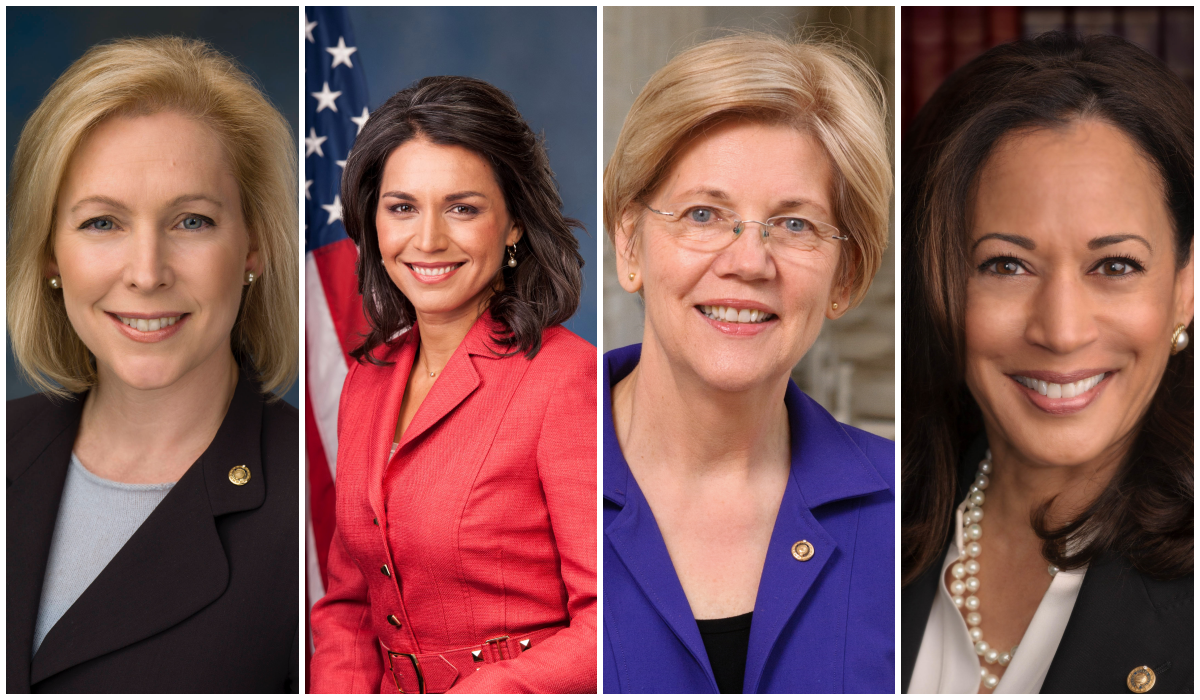If you have been following any events in America over the last couple of years you have probably heard the phrase ‘watershed moment’ more than once or twice. It was a watershed moment when the most diverse House of Representatives was elected in 2018. It was a watershed moment when millions marched in protest against the Trump presidency. It was a watershed moment when Hillary Clinton, almost, became the first female President of the USA. Things are apparently changing in the US and another watershed moment was announced this week, with a record-breaking four women already having announced their candidacy for President.
In the past Hillary was typecast as the ‘Female’ candidate, capital F. Now, with a diverse group of women running, maybe they will be analyzed as individuals rather than simple archetypes? It’s a reach to suggest that the Trump campaign will put aside their gender should one of the female candidates become the Democratic Nominee but the press would have to be supremely lazy if it failed to do the same. Maybe this time around the candidates’ policy and ability will be their distinguishing features when they are discussed in the media.
Then again, maybe not.
At this early stage, 20 months off the 2020 election, the same sexist narratives are already at play in the media. When Kirsten Gillibrand, Senator of New York, announced her candidacy the very first question she received from the press was about whether she considered herself likable enough to win. When Elizabeth Warren, Senator of Massachusetts, announced her candidacy Politico tweeted a similar question – “Is she too unlikable to win?” affirming that a lack of likability was Hillary’s downfall.
But why is wanting a candidate to be likable sexist? There are two key reasons. The first is that, in general, male candidates don’t get questioned about their likability unless there are very strong reasons for it. It takes a lot for a male candidate to suffer from being unlikable, just look at Trump. The second reason is that the media’s criteria for being likable as a woman are incompatible with being ambitious, intelligent, or powerful. So by becoming a Presidential candidate, a woman by default becomes unlikable. This is why the likability of these women wasn’t called into question in their roles as Senators and Representatives but only when their ambition reached levels deemed ‘above their station’.
It’s easy to blame conglomerates like Fox News for perpetuating the same tired stereotypes. But in a country like the US with a free press, media content is at its heart a reflection of public opinion. Media is a product and it needs to be attractive to the buyer. This suggests there is a demand from the general public for content which depicts female candidates in this way. A poll conducted at Fairleigh Dickinson University in 2016, just before the Presidential Election, found that when asked to describe Hillary in a single word the most common response was ‘bitch’.
If sexism is rife in US society in general, then, of course, it will be reflected in the press. Then, in turn, the public is fed this message that female candidates are not viable candidates. It’s a vicious cycle that isn’t going to change overnight. We know this by looking to the UK. We have our second female Prime Minister but the British press is still printing unashamedly sexist headlines such as the Daily Mail’s which compared Theresa May and Nicola Sturgeon’s legs at a key Brexit meeting in 2017. There is still a long way to go, even with women in positions of power.
It sounds disheartening but this also suggests hope for the future. All of the changes over the last few years suggest that public opinion in America is slowly changing. The latest Gallup poll says that 92% of Americans would vote for a female candidate. So maybe some way down the line, we might see a filtration of more progressive ideas into the mainstream press. Every step in the right direction should be celebrated but to expect things to change overnight would be to forget how long it has taken to get to this point. This is undoubtedly an exciting moment in US politics but a watershed one: not so much.
Alex Chitty

